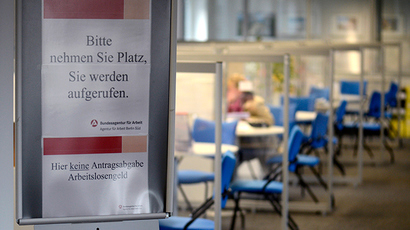German party wants to force guest workers to abandon native tongues

The rise of immigration in Germany is prompting one of the parties in the government coalition to seek a requirement that would oblige all foreigners to speak only German in public and at home. The proposal has caused a wave of criticism.
A comrade in the coalition led by Chancellor Angela Merkel's Christian Democratic Union (CDU), the Christian Social Union (CSU), is due to approve a party draft policy paper proposal on Monday, requiring immigrants to practically abandon the use of their native tongue.
In the paper, as quoted by Reuters, the CSU says: "People who want to remain here on a permanent basis should be obliged to speak German in public and within the family."
CSU argues that “social interaction works only when all speak the same language”, and says that all foreigners who enter to remain will be offered a language training course.
It was not immediately clear how the party proposes to enforce such a rule without invasive surveillance of immigrants’ homes – a measure that most likely would be deemed unacceptable in privacy-weary Germany.

Wolfgang Bosbach, a member of Merkel's conservative CDU, agrees with the CSU proposal, arguing that speaking German is crucial for the immigrant integration process.
"Language skills are of paramount importance for good integration opportunities. Therefore, it is important to speak with children at home also in German," Bosbach told Bayerische Rundfunk.
Yet the new proposal was swiftly denounced by the other parties in Merkel's government, including a senior official from the chancellor's Christian Democratic Union (CDU).
"It is not the business of politicians whether I speak Latin, Klingon or Hessian at home," Peter Tauber, general secretary of the CDU, said on Twitter.
Yasmin Fahimi, for the Social Democrats (SPD), called the proposal "totally absurd".
"The state has no role to play in deciding what language people speak within the walls of their own home," Fahimi told German newspaper Bild.
READ MORE:Germany world’s 2nd immigration destination with spike of almost 40%
The latest data released by Germany's statistics office show record immigration last year, with most of the new arrivals coming from European Union countries like Poland, Bulgaria and Romania in search of employment. The influx of 1,226,000 people to Germany in 2013 shows an increase of 13 percent from 2012, the highest on record since 1993.














